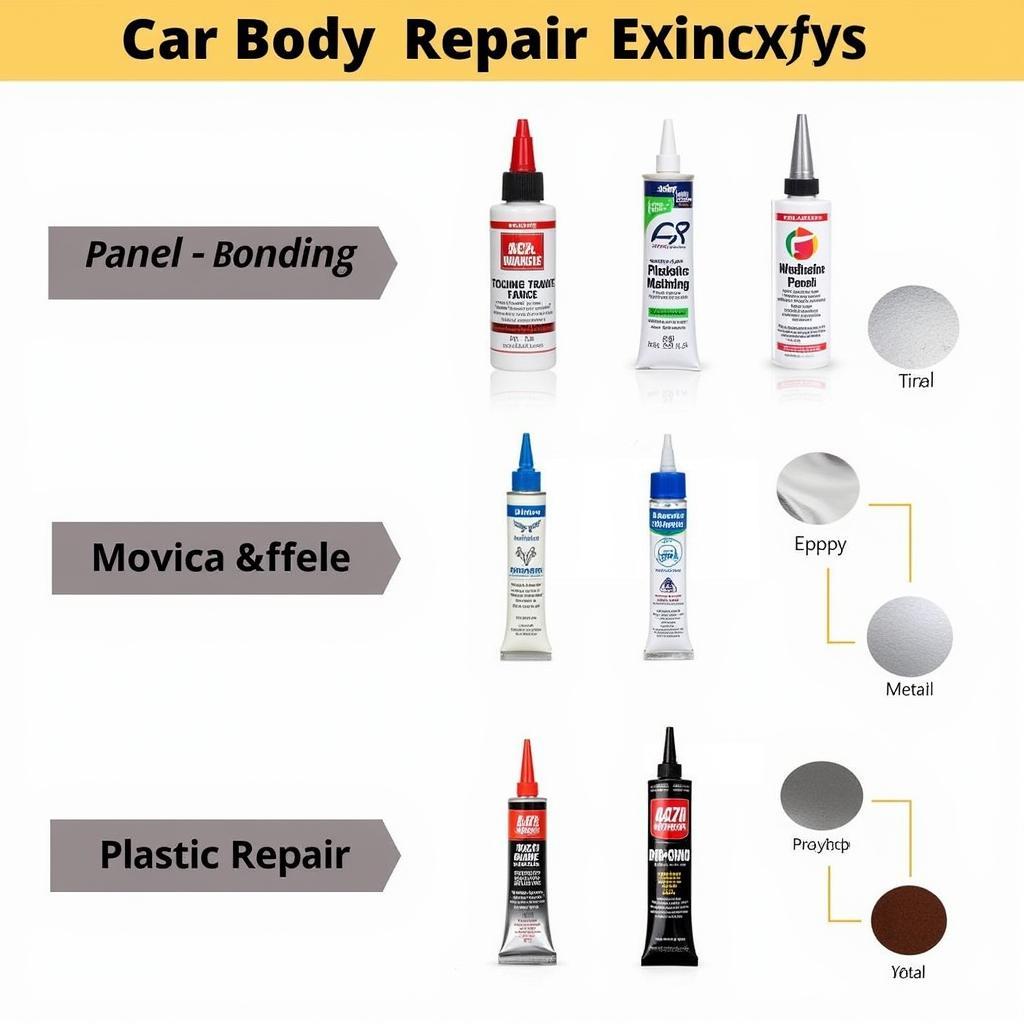Car body repair adhesive is a crucial component in modern auto body work. Whether you’re a professional mechanic or a DIY enthusiast, understanding its uses, types, and application techniques is essential for achieving a flawless and long-lasting repair. This guide will delve into everything you need to know about car body repair adhesive, empowering you to make informed decisions and achieve professional-grade results.
Choosing the right adhesive for your specific needs can be overwhelming given the wide variety available. This guide will simplify the selection process, covering everything from epoxy adhesives to panel bonding adhesives and plastic repair adhesives. We’ll explore the strengths and weaknesses of each type, helping you determine the best fit for your project. Understanding the specific requirements of different materials, such as metal and plastic, is crucial for a successful repair. We’ll also discuss proper surface preparation, which is fundamental for achieving optimal adhesion.
Types of Car Body Repair Adhesives
Selecting the appropriate car body repair adhesive depends on the materials being bonded and the type of repair being performed. Let’s examine some common types:
- Epoxy Adhesives: Known for their strength and durability, epoxy adhesives are excellent for bonding metal and filling gaps. They are a two-part system, consisting of a resin and a hardener, that must be mixed before application.
- Panel Bonding Adhesives: Specifically designed for bonding body panels, these adhesives offer high strength and flexibility. They often come in cartridges for easy dispensing with a caulking gun.
- Plastic Repair Adhesives: Formulated for repairing plastic bumpers, trim, and other components, these adhesives often cure quickly and can be sanded and painted. car body plastic repair offers more information on this specific topic.
 Different Types of Car Body Repair Adhesives
Different Types of Car Body Repair Adhesives
Surface Preparation: The Key to a Strong Bond
Proper surface preparation is paramount for achieving a strong and lasting bond. This involves cleaning the surfaces to be bonded, removing any rust or corrosion, and potentially roughening the surface to improve adhesion.
- Cleaning: Thoroughly clean the area with a degreaser or solvent to remove any dirt, grease, or wax.
- Rust Removal: If rust is present, remove it with a wire brush, sandpaper, or a chemical rust remover.
- Surface Roughening: Lightly sanding the surfaces with sandpaper can create a better surface for the adhesive to grip.
Applying Car Body Repair Adhesive
Once the surfaces are prepared, applying the adhesive correctly is essential for achieving optimal results. Follow these general steps:
- Mix the Adhesive (if necessary): Two-part adhesives, like epoxy, must be mixed according to the manufacturer’s instructions.
- Apply the Adhesive: Apply a uniform layer of adhesive to one or both surfaces to be bonded.
- Join the Surfaces: Bring the surfaces together and clamp them firmly in place.
- Curing Time: Allow the adhesive to cure completely according to the manufacturer’s instructions before removing the clamps.
What is the best adhesive for metal car body repair?
For metal car body repair, epoxy adhesives and panel bonding adhesives are generally the best choices. adhesvie metal car body repair provides a detailed comparison of different options.
What type of sealant is used for car bodywork repair?
Various sealants can be used for car bodywork repair, depending on the specific application. car bodywork repair sealant explores the different types of sealants available and their specific uses.
Where can I find car bodywork repair supplies?
A wide range of car bodywork repair supplies, including adhesives, can be found at automotive parts stores, online retailers, and specialty shops. car bodywork repair supplies offers a comprehensive list of suppliers.
Which epoxy is best for car body repairs?
Choosing the best epoxy for car body repairs depends on the specific repair. best epoxy for car body repairs offers a detailed guide on selecting the right epoxy.
Conclusion
Car body repair adhesive is an invaluable tool for achieving professional-quality repairs. By understanding the various types of adhesives, proper surface preparation techniques, and correct application methods, you can confidently tackle a wide range of car body repair projects and achieve long-lasting, reliable results. Remember, choosing the right adhesive and preparing the surfaces meticulously are crucial for a successful and durable repair.
FAQ
- How long does car body repair adhesive take to cure? Curing times vary depending on the type of adhesive and the ambient temperature. Always refer to the manufacturer’s instructions.
- Can I paint over car body repair adhesive? Many car body repair adhesives can be sanded and painted once fully cured.
- Is car body repair adhesive waterproof? Most car body repair adhesives are designed to be waterproof, but always check the product specifications.
- What is the strongest car body repair adhesive? Epoxy adhesives and panel bonding adhesives are generally considered the strongest options.
- How do I remove cured car body repair adhesive? Cured adhesive can be difficult to remove. A heat gun, chisel, or specialized adhesive remover may be required.
- Can I use car body repair adhesive on fiberglass? Some car body repair adhesives are suitable for fiberglass, but ensure the product is specifically designed for this material.
- Where can I buy car body repair adhesive? Car body repair adhesive is available at automotive parts stores, online retailers, and specialty shops.
Common Car Body Repair Adhesive Scenarios
- Repairing a cracked bumper: Plastic repair adhesive is ideal for fixing cracks in plastic bumpers.
- Bonding a replacement body panel: Panel bonding adhesive is specifically designed for this purpose.
- Filling a small dent in a metal panel: Epoxy adhesive can be used to fill small dents and provide a strong base for body filler.
Further Reading
For more information on related topics, check out our articles on specific adhesive types and repair techniques.
Need Help?
Contact us via WhatsApp: +1(641)206-8880, or Email: [email protected]. Our 24/7 customer service team is ready to assist you.
